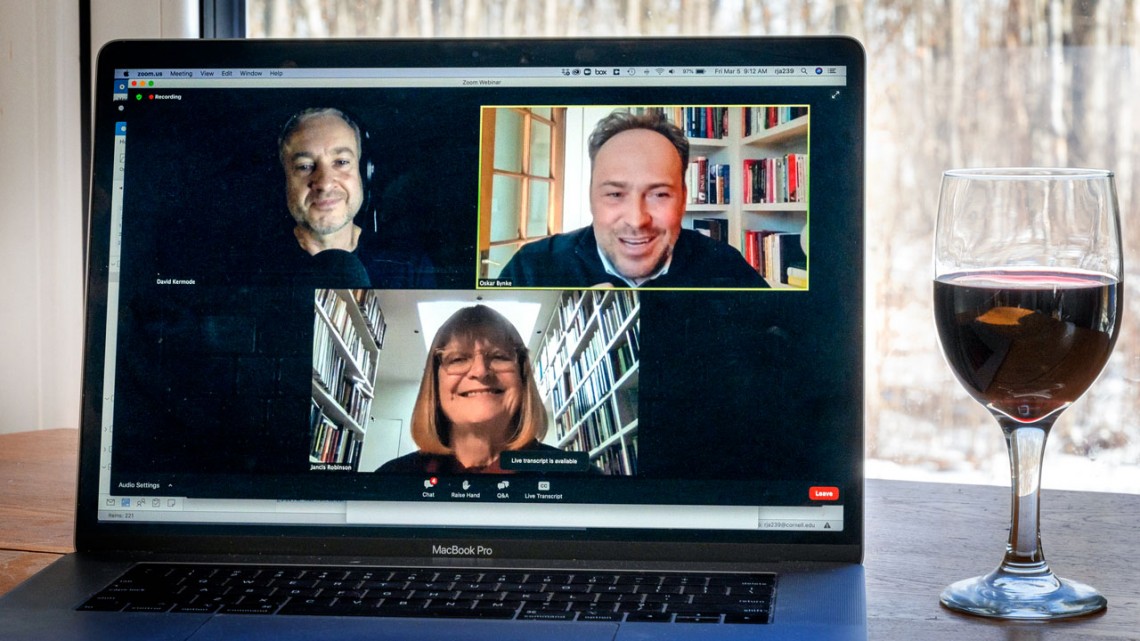
The virtual B.E.V. NY conference, held March 3-5, drew 471 attendees from across the U.S. and Canada.
Virtual wine event addresses COVID-19, climate change
By Erin Rodger
Meeting COVID-19 requirements was a sobering task for New York state wineries, but some found that changes such as requiring reservations and offering a la carte menus boosted business, according to a survey presented at the recent virtual B.E.V. (Business. Enology. Viticulture.) NY conference, held March 3-5.
Hosted by Cornell’s Extension Enology Lab and Finger Lakes Grape Program in partnership with the New York Wine and Grape Foundation (NYWGF), this year’s event drew 471 attendees from across 12 states and Canada.
One of the conference’s most popular events was a workshop reflecting on how COVID-19 tasting room changes impacted customer satisfaction and purchasing habits.
Trent Davis, research specialist, and Miguel Gomez, the Robert G. Tobin Professor of Food Marketing in the Charles H. Dyson School of Applied Economics and Management, presented findings from an October 2020 survey from two wineries – one with a national reputation and one with a smaller reputation in the Finger Lakes region of New York.
Both wineries lowered capacity to 50% or less, offered outdoor seating and table service and encouraged customers to make advance reservations. One had an a la carte menu while the other offered an a la carte menu and flights of wine.
Davis and Gomez said that of the customers they interviewed, 70% made advanced reservations and 91% enjoyed the pandemic-related modifications they were offered at both wineries.
Customers cited increased interaction with winery staff and the seated-table experience as the predominant positive factor. Davis and Gomez also found that when customer satisfaction was rated “exceeded expectations,” total dollars spent rose 29% and the number of bottles purchased rose 32% compared with those who rated their experience lower.
At the workshop, speakers encouraged wineries to keep current models post-pandemic, or try out some sort of hybrid tasting room model combining reservations and walk-ins, table service and bar tastings, as well as a la carte ordering and wine flights.
In addition to events focused on navigating COVID-19, this year’s B.E.V. NY tapped into international expertise to help wineries plan for success.
The headline speaker was Jancis Robinson, a globally renowned wine writer who has authored several encyclopedic wine books, hosts a weekly column for the Financial Times and advises Queen Elizabeth II on her wine cellar.
Robinson – voted in numerous polls as the world’s most influential wine critic – spoke about how to elevate New York wines on the world stage through strategic production, promotion and the understanding of market challenges and opportunities.
“As a longtime attendee of B.E.V. NY, this year’s event stands out,” said Brittany Gibson, executive director of the Seneca Lake Wine Trail. “Jancis Robinson’s keynote… touched on everything from the importance of diversity, equity and inclusion being key to moving the wine community forward, to sustainability and marketing, and seemingly everything in between.”
Hans Reiner Schultz, president of the Hochschule Geisenheim University in Germany, spoke about helping wineries plan for climate change.
Because parts of New York’s wine regions are similar to Germany’s famed Mosel wine region in terms of temperature, humidity and growing conditions, Schultz provided several case studies on how climate change has impacted German vineyards and suggestions about how New York vineyards could benefit from mitigation tactics being used in Germany.
Benjamin Houlton, the Ronald P. Lynch Dean of the College of Agriculture, encouraged winemakers and grape growers across New York state to consider climate change an important part of their strategies in the years ahead.
“Changing the future will require new methods, but it also will require adjusting our current practices to have better environmental results,” Houlton said. “Connect with us and, for those in New York state, also connect with your county cooperative extension office for the latest in climate change information that is applicable to the wine industry.”
Experts from the Australian Wine Institute, the College of Agriculture and Life Sciences and the University of California, Davis, also spoke about the latest integrated pest management and vineyard and enology techniques for a wide array of issues being faced by wine and grape producers in New York.
“Cornell lights the way for our industry with expertise to help us rise above the challenges of our time,” said Sam Filler, executive director of the NYWGF. “This year’s B.E.V. NY showcased how effective Cornell is at offering valuable and timely content in a format that can reach broad audiences.”
Erin Rodger is the senior manager for marketing and communications at Cornell AgriTech.
Media Contact
Get Cornell news delivered right to your inbox.
Subscribe

